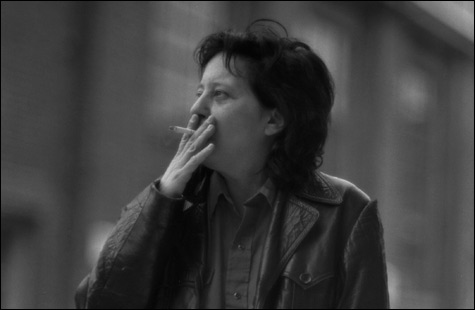
TOUGH AND TANGLED: Thalia’s music lies at the crossroads of apocalyptic poetry and the demon blues. |
It’s a bright, blue Friday afternoon, and Thalia Zedek is hunched over a pint at the Cambridge Brewing Company, looking a bit like a grizzled veteran of some sort of mythical rock-and-roll war. It’d be great to continue on in that vein — contrasting the beautiful weather with Zedek’s dark and stormy disposition. Then again, maybe not. She saves me the trouble. “If you know me as a person,” she says with a disarming gentle chuckle and subtle smirk, “I like to laugh and have fun.”
That’s not quite the impression most attentive listeners would come away with from her new Liars and Prayers (Thrill Jockey), and it’s certainly not the sense she’s conveyed over the past 25 years — first as the frontwoman in the Boston post-punk outfit Uzi, then as a member of NYC’s art-damaged Live Skull, then returning to Boston to join forces with guitarist Chris Brokaw in Come (who were hand-picked as an opening act by both Kurt and Courtney but never fully emerged from Alternative Nation). After a good run (four albums in six years), Come called it quits in time for the new millennium. Brokaw found plenty of work as a hired guitarslinger; Zedek slowly graduated to her solo career.

More than just Zedek’s singing and songwriting, the one constant has been her presence: stoic yet haunted, desperate yet never quite despairing, wounded yet resilient, with a touch of androgyny to top it all off. On the first Come album, 1992’s Eleven: Eleven (Matador), she sang the Jagger/Richards tune “I Got the Blues.” Her first solo album, 2001’s Been Here and Gone (Matador), featured her interpretation of Leonard Cohen’s “Dance Me to the End of Love.” To the extent you can gauge an artist by the songs they choose, the Zedek æsthetic lies somewhere near the crossroads where apocalyptic poetry meets the demon blues, where stormy passions find poignant release.
And so it remains: the piano that found its way into the final Come line-up has become more dominant on her solo albums, and viola has emerged to spar with her thorny guitar — but neither has brought with it a lighter touch. Liars and Prayers is as tough and tangled, as heavy and just plain angry, as anything she’s recorded. As with the best of Come, the songs don’t follow strict verse/chorus/verse structures so much as they build momentum, each instrument coalescing around a central motif, minor-key melodies buoying waves of emotion, until the band, on the verge of discord, reach a controlled climax.
For the first time since Come’s demise, Zedek feels she has, as she puts it, “a real band-band,” with bassist Winston Braman joining long-time viola player David Michael Curry, pianist Mel Lederman, and drummer Daniel Coughlin. The new album, which they’ll celebrate with a show downstairs at the Middle East on May 23, is even credited to the Thalia Zedek Band rather than just Zedek.
“When I did my first solo album in 2001, I thought that I’d be playing with different people on each album. I’d been the primary songwriter for years and years, and I felt like I lost those songs when Come broke up. So I was going to go under my own name. I also just didn’t want to ask for a big commitment from anyone. So I thought I’d just play with David and Mel on that first album. Over the years, they all did their own stuff, but they never really left. So it had become a real band. I mean, we’ve been playing together for seven years. Me and Mel are like brother and sister. I don’t know if it’s the Russian Jew in us, but he just gets it without me having to say anything. And Dave’s kind of like that too, because he just adds so much to the songs without me having to say anything.”
That sense of unity may account for some of the turbulent power of Liars and Prayers. But the lyrics — especially in “Begin To Exhume,” “We Don’t Go,” and “Body Memory,” three of the disc’s weightier tracks — belie any method to the madness. However Zedek’s lyrics may tend toward the personal, they’re usually veiled. Political commentary is something she usually avoids; yet here there’s the repeated chorus “We don’t go/So we don’t know” and the lines “killing time with laughter/Or killing time with war” in “We Don’t Go,” as well as her raw-throated “There will come a day when everyone will pay” over the noisy assault of “Begin To Exhume.” And “Body Memory” was inspired by the death of a close friend in 2006, poetry-slam champ Lisa King.
“I’m not one of those people who’s very creative during emotional turmoil,” she points out. “I guess I need some time to process it. And I don’t like to write about politics. But it’s just too hard to ignore right now. I didn’t grow up with George Bush, so I can tell that things are really, really fucked up.”